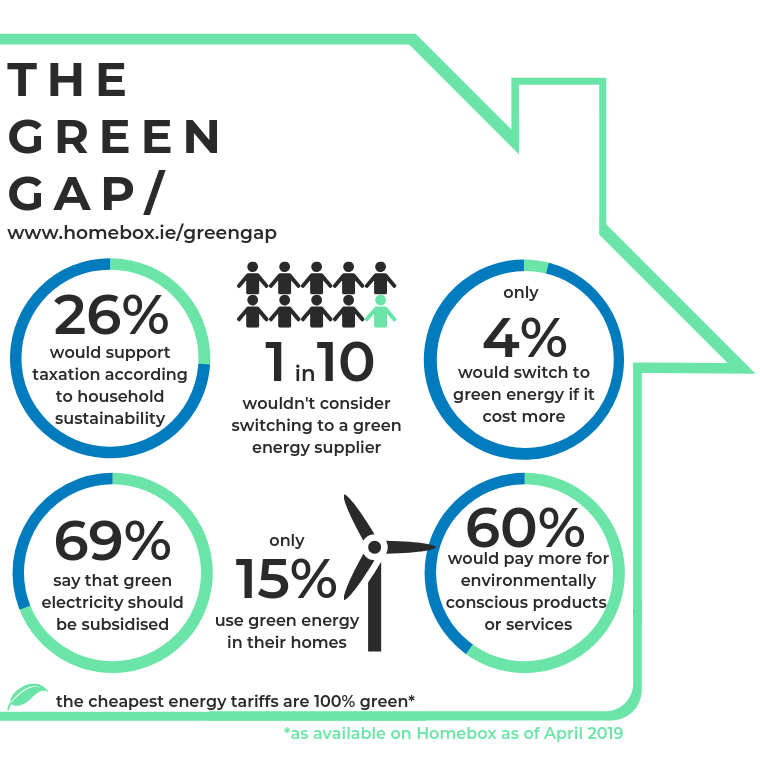More people would be prepared to be taxed according to their household sustainability levels

New research into the environmental attitudes and priorities of people living in the East Midlands has identified a ‘green gap’ in our attempts to be more eco-friendly in our homes.
More people in the East Midlands (21 percent of residents) would be prepared to be taxed according to their household sustainability levels than use green energy in their homes (12 percent), despite it being recognised as a priority in a bid to tackle climate change.
Green energy is the area where we are least likely to put our money where our mouth is. Over half (54 percent) of East Midlands residents claim they would be willing to pay more for a product or service if it were better for the environment, but only five percent would use a green energy supplier that cost more than a standard supplier.
Almost a third (31 percent) would need green electricity to be cheaper than their standard supplier before they would change. Over one in 10 (14 percent) wouldn’t even consider switching to a green energy supplier, particularly older respondents, no matter the price.
Well over half (58 percent) believe that green electricity should be subsidised to encourage people to use it.
In comparison to buying electricity from green energy suppliers, more people from the East Midlands support the installation of wind turbines or solar farms nearby (18 percent), grow their own food (21 percent), holiday in the UK to avoid air miles (22 percent), purchase fair trade items (26 percent) or only flush the toilet when absolutely necessary (51 percent).
The research, by online household bill management platform Homebox, reveals the list of the East Midlands’ ‘green’ activities and a list of environmental priorities, with reducing the use of plastics, reducing energy use, reducing carbon emissions and recycling waste taking the lead.
Hedley Smith, Founder of Homebox, comments: “Unsurprisingly plastic is dominating the climate change agenda, topping the list of environmental issues that people are prioritising right now. But this masks other important steps that people could take which would have significant environmental benefits, where there is a huge lack of understanding. People still don’t seem to realise that green energy is easy to find, simple to switch to and one of the cheapest energy options for their home. In fact, all the cheapest energy tariffs currently available are 100% green*. It makes no sense to be prepared to pay more for fair trade food, but not choose to spend the same, or less on more eco-friendly energy for your home.”
When it comes to understanding the impact of their choices in the wider scheme of climate change, 50 percent of people living in the East Midlands feel they have some understanding, but not enough, and almost one in 10 (9 percent) say they have almost no clue at all of how their own choices contribute to climate change.
For example, 50 percent of people claim they would switch to a green energy supplier if it cost the same as their standard supplier. The fact that green energy does cost the same, or less, but people still aren’t switching, demonstrates a clear lack of understanding.
Younger people in particular are confused and inconsistent in their approach to green activities. According to the national statistics taken from the research, those aged 34 and under are more likely to be pessimistic about their own personal impact on tackling climate change. 76 percent of 18-34-year olds doubt the effectiveness of domestic measures such as using energy efficient light bulbs, growing your own food, or switching appliances off rather than keeping them on standby.
18 percent of Brits feel guilty about not being more sustainable, rising to 52 percent of 18-24-year olds. 20 percent of under 35s have felt self-conscious when using something they know to be bad for the environment, and this group is three times more likely to pretend to friends or colleagues that they are more sustainable than they actually are.
Younger people (aged 35 and under) are also more than twice as likely as those aged 45+ to have a disposable attitude to fashion, admitting to having thrown away clothing after three years or less. This group is also significantly more likely to have turned vegetarian or vegan in a bid to help the environment, with 21 percent of those surveyed having made this choice compared with 10 percent of the nation on average.
Hedley Smith concludes: “Climate change is one of the biggest issues of our time and as a society we aren’t doing enough about it. Our research shows that we feel guilty about climate change and even go as far as pretending to be more sustainable than we are, but none of us will want to look back and regret not having done more, when the stakes are so high. Our everyday actions can make a huge difference. We can all vote with our wallets, putting pressure on companies to do more. We live in a time where the power to make change through the use of technology, is unprecedented. Let this be the light bulb moment when we make some new, easy and effective environmental choices in our homes, such as switching to green energy.
We at Homebox want to help people become ‘greener’ in a fair and easy way. Unlike traditional price comparison websites, we help people not just switch, but to stay on the best deal for all their household bills, taking away the hassle and headache of always shopping around. Now, with green energy there are plenty of great tariffs to choose from. We have also created a list of tips to explain what other steps people can take in their own lives to really make a difference. These can be found at www.homebox.co.uk/blog/greengap.”




